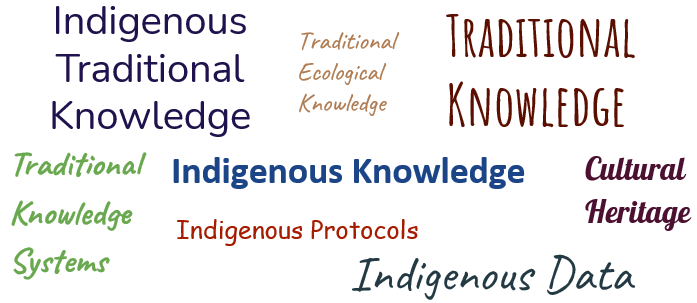Module 1: Ethical and Legal Considerations
Key Concepts and Definitions
Indigenous Traditional Knowledges

The federal government is changing its terminology from “Traditional Knowledge” to “Indigenous Knowledge.”
The curriculum designers for this course use the term “Indigenous Traditional Knowledges” throughout this course (if not directly quoting from another source) to mean all components of Indigenous cultures, including but not limited to dances, artwork, designs, stories, (oral) histories, traditions, protocols, legal systems, and Knowledges. “Indigenous Knowledge,” “Traditional Knowledge,” “Indigenous data,” and “Indigenous Traditional Knowledge,” etc. are all interchangeable terms. We have chosen the term that reflects our teachings, but individual Indigenous communities have the right to choose what term reflects them best.
Learner notes
Source and recommended reading: Indigenous Knowledges and Canadian Copyright Law (University of Saskatchewan Library)
Defining the principle of ethical and legal considerations
Indigenous research ethics respect leadership and require developing trusting relationships. While there is much diversity among Indigenous Peoples and Nations, Indigenous ethics resonate with the values of honour, trust, honesty, and humility. They reflect a holistic ethical commitment to the collective and extend ethical considerations beyond human participants to include the land.
Learner notes
It is important to understand the term “ethical” through an Indigenous lens as we move through this module and course. There is a colonial past that causes trust to be highly important to Indigenous Peoples.
Source and recommended reading: Indigenous Ethics and Values (Pulling Together: A Guide for Researchers, Hiłḵ̓ala)
Defining the principle of data sovereignty
“Indigenous data is any information that is from or about any Indigenous person or their community, territory or nation, including but not limited to their languages, Knowledges, customs or traditions, intellectual property and ideas. Indigenous data are also relational and reciprocal, and need to reflect and be held by the community as a collective, and are equally as important to pass down through generations as a part of lifelong journeys of coming to be.”
— Cited from Indigenous Data Sovereignty (Indigenous Studies Research Guide at the University of Toronto)
Learner notes
Therefore, Indigenous data sovereignty is inclusive of Indigenous Traditional Knowledges.
Defining the principle of Indigenous data governance
“Indigenous data governance is the system of decision making rights and accountabilities by an Indigenous government or institution for information-related processes, executed according to agreed-upon models which describe who can take what actions with what information, and when, under what circumstances, using what methods. It is the enactment of Indigenous data sovereignty principles.”
— Cited from Indigenous Knowledge and Data Sovereignty (FutureCitiesCanada) [PDF]
Fundamental knowledge
- Upholding and acting upon the Calls to Action listed in the Truth and Reconciliation Commission and the articles in the United Nations Declaration on the Rights of Indigenous Peoples.
- Respecting and following data sovereignty principles, especially for research pertaining to First Nations, Urban Indigenous, Inuit, and Métis Peoples by committing to a distinctions-based approach in relationships with each.
- Practicing, role modelling, and teaching these fundamentals.
Attributions
- “Terms for Indigenous Traditional Knowledges word cloud” photo by Connie Strayer and Robyn Grebliunas is licensed under a CC BY 4.0 license.

